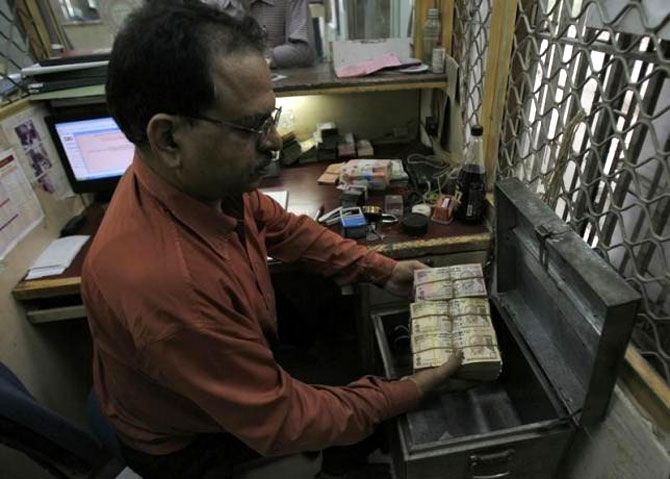Lack of decisiveness and courage to deal with PSBs may turn out be the biggest impediment to the Modi government’s economic initiatives, says Debashis Basu.

For more than a year, the government has been deriding all those who have been disappointed with the lack of “big-bang reforms”. The finance minister has even quipped: “I have asked many people what do they mean by big-bang reforms, but nobody seemed to have a clear idea.” Maybe he is asking the wrong people. After all, one major reform, big-bang or not, that was begging to get done was right under his nose: to how public sector banks (PSBs) are managed. Unfortunately, not only has there been no big-bang reform of PSBs, but the government has not even started incremental reforms. In fact, the government is falling short even on maintenance work. Several PSBs have been headless for over a year now.
This lack of decisiveness and courage to deal with PSBs may turn out be the biggest impediment to the Modi government’s economic initiatives, which depend on heavy public investments, with the money mainly coming from PSBs. But PSBs simply have no cash to lend. Not only that, they even need a fat dole from the government to meet the Basel-III norms on capital adequacy. We will wait to see whether the incrementalism favoured by intellectual heavyweights in this government can handle the coming crisis in PSBs.
Meanwhile, on June 8, the Reserve Bank of India (RBI) issued a circular called “Strategic Debt Restructuring Scheme”. Under this, when a bad loan is restructured, lenders must incorporate an option to convert the loan into shares if the borrower can’t stick to viability milestones and/or “critical conditions” of the restructuring package. Banks should have in their pocket “necessary approvals/authorisations from the borrower company ... to enable the lenders to exercise the said option effectively”.
Lenders must aim, exhorted the RBI, to acquire majority shareholding in the company. This move by the RBI should have sent shivers down the spine of defaulters and boosted the prospects of the banks. Instead, here is how the shareholders of some of the PSBs reacted: Bank of Baroda down 8.81 per cent, Punjab National Bank down 7.72 per cent, Canara Bank down 4.95 per cent. Clearly, the RBI’s credibility about getting PSBs to act on bad loans is really low.
There is a reason for this. This is not the first time the unaccountable and lackadaisical banking regulator has tried to tell banks how to handle bad loans. More than a year ago, in February 2014, the RBI had issued a 4,500-word “guideline” grandly called “Framework for Revitalising Distressed Assets in the Economy - Guidelines on Joint Lenders’ Forum (JLF) and Corrective Action Plan (CAP)”.
Paragraph 5.3 of that guideline lectures banks that the “general principle of restructuring should be that the shareholders bear the first loss rather than the debt holders”. Also, “to ensure more ‘skin in the game’ of promoters, lenders may consider the possibility of transferring equity of the company to the lenders”, force promoters to bring in more equity or “transfer the promoters’ holdings to a security trustee or an escrow arrangement till turnaround of company. This will enable a change in management control, should lenders favour it”.
The results of this “guideline”? A dramatic increase in bad loans, the continued evergreening of bad accounts - and, what is worse, the continued dubious new lending by PSBs, with minimal collateral, arranged by touts. Much of this new lending will turn bad in the coming years.
On the other hand, last year would have been the best time for banks to have taken over hundreds of companies because they failed to meet their restructuring conditions. How many companies have PSBs taken over? Not one that can either send a signal or change the way bad loans are handled.
These guidelines are the latest in the continuing farce that has been playing out for 46 years after banks were nationalised. PSBs lend callously. Then loans go bad and both bankers and promoters get away. When the bad loan issue really starts hurting the economy, the government and the RBI appoint committees: the Tandon committee of 1975, the H N Ray committee in 1976, and the Tiwari committee of 1981 ... .
The last one suggested a new law and a quasi-judicial body. This created the Sick Industrial Companies (Special Provisions) Act in 1985 and the Board for Industrial and Financial Reconstruction in 1987. By 2001, all these initiatives, expectedly, had failed. The situation became so bad that a new law was needed: the Securitisation and Reconstruction of Financial Assets and Enforcement of Security Interest Act, 2002.
But bad lending again became so rampant after this Act came that debt recovery tribunals are clogged now. Meanwhile, banks lend more money to large companies through corporate debt restructuring under the auspices of the RBI — but for which the central bank is not responsible.
Nobody has to pay a price for this continuing charade. Not the promoters, not the bankers, not the RBI officials. The ministry officials and politicians, who help enact more hopeless laws, of course, are blameless. And now, the RBI is telling banks – again – you may take control of companies that can’t pay. Why should they? How can they run companies? What is the price they will pay to ignore another RBI guideline?
All this farce will end only the day PSBs have a strong internal mechanism for protecting their self-interest. The world has discovered that mechanism aeons ago. It is called private enterprise and privatisation. Too bad for us that the Modi government will see it as highly avoidable “big-bang reform” and would rather depend on more laws and guidelines - even if they have impoverished us for 46 years.
Debashis Basu is the editor of www.moneylife.in







 © 2025
© 2025